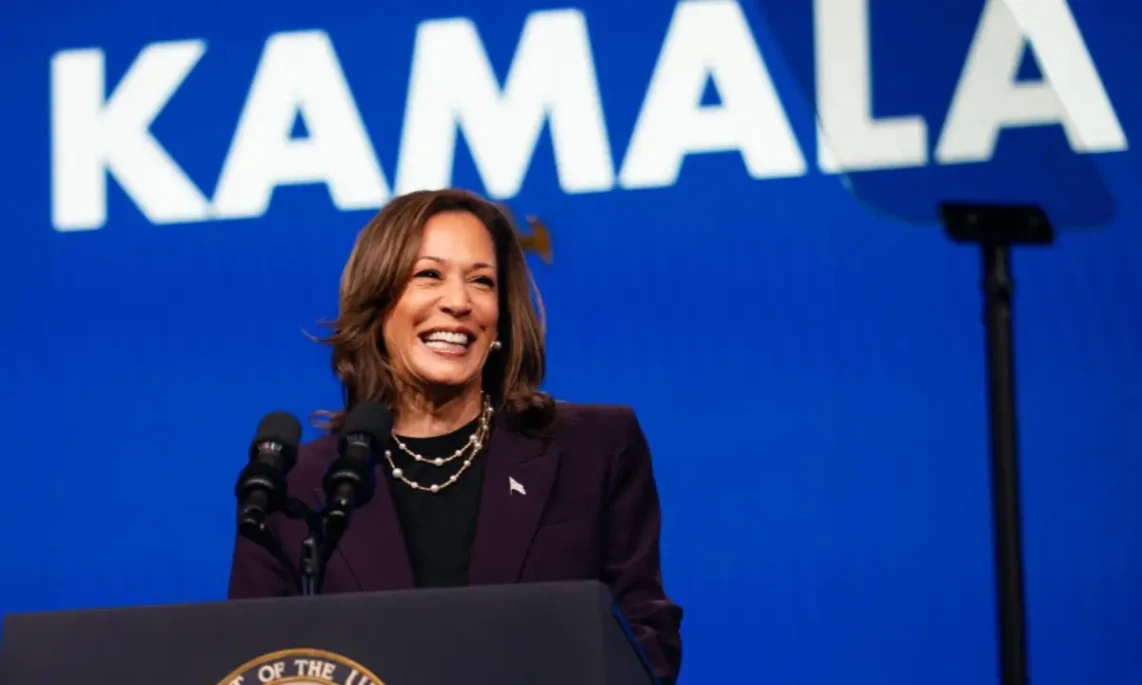How Vice President Kamala Harris answered questions this week about her stance on slavery reparations for African-Americans has elicited wildly varying responses from proponents of reparations as well as other racial justice advocates and political observers.
Some say the Democratic presidential nominee dodged the question, while others credit her for offering a frank and thoughtful position on the issue, unlike her Republican opponent, former President Donald Trump, who does not support reparations.
During an interview with Politico writer Eugene Daniels at the National Association of Black Journalists conference in Philadelphia on Tuesday, Daniels noted that as a U.S. senator, Harris co-sponsored a bill to establish a federal commission to study the history of slavery in America and to recommend proposals for slavery reparations.

Some versions of the reparations bill have been introduced in Congress over the past three decades and have never passed, facing strong Republican opposition.
President Joe Biden in 2021 said he supported the idea of studying reparations but stopped short of saying he would sign the bill if it cleared Congress.
Daniels asked Harris if she would take executive action as president to create such a commission, “or do you believe it should happen in Congress?”
“I think Congress ultimately will have the ability to do this work,” Harris replied. “I’m not discounting the importance of any executive action, but ultimately Congress, because if you’re going to talk about it in any substantial way, there will be hearings, there will be a level of public education and dialogue … to ensure that everyone can participate in this conversation in a way that elevates knowledge about history.”
“We need to speak truth about the generational impact of our history, in terms of the generational impact of slavery, the generational impact of redlining, of Jim Crow laws,” Harris said. “And we need to speak truth about it in a way that’s deriving solutions.”
Harris then plugged the “opportunity economy” policy she has been promoting on the campaign trail as “part of what we can do right now,” arguing that it “is addressing explicitly the obstacles that historically and currently, including disparities, exist and dealing with them — student loan debt, medical debt, bias in home appraisals … and Black maternal mortality.”
Reactions to what Harris told the NABJ audience have been mixed.
Kamm Howard, co-chair of the National Council of Blacks for Reparations, who testified before a Congressional committee in 2021 in favor of the House reparations bill, posted, “Biden-Harris, No More Fake Support of Reparations Commission. An Executive Order Is The Only Way!”
X user @ejmills42 called Harris’s answer “2 minutes and 47 seconds of “I plan to do nothing for the reparations cause, ” while @billion2022 said, “Every answer on this topic is a rehearsed dodge.”
https://twitter.com/billlion2022/status/1836388280515887489
But Harlem Ant argued that, “If an Executive Order could’ve done that I imagine Obama would’ve done it on his way out. As she states Congress needs to conduct hearings and educate the American people on why we’re owed reparations.”
HR 40, the bill recently sponsored by the late Rep. Sheila Jackson Lee, would “formally acknowledge the fundamental injustice and inhumanity of slavery in the U.S., and establish a commission to determine how best to make reparations for the institution of slavery, its subsequent racial and economic discrimination …against African Americans, and the impact of these forces on living African Americans. This Commission would then craft a proposal on how to implement reparations and present this as recommendations to Congress,” the Texas Democrat explained in a post on X in February.
A political columnist for the New York Post criticized Harris’s “non-answer” on reparations as a “signature word salad,” while The Trump War Room, an X account affiliated with the Trump campaign, posted that “Kamala incoherently filibusters when asked about her past support of a multi-trillion-dollar reparations plan.”
“Trump’s plans for reparations are what exactly?” asked Webets, an X user who frequently criticizes Trump.
In 2019, former President Trump told The Hill he didn’t see reparations happening at the federal level.
“I think it’s a very unusual thing,” Trump said of the possibility of reparations. “You have a lot of — it’s been a very interesting debate. I don’t see it happening, no.”
William Darity, an economics professor at Duke University who focuses on racial inequities and a staunch supporter of reparations, told Atlanta Black Star, “I have never heard Harris say she supports such a comprehensive federal program for Black Americans whose ancestors were enslaved in the United States.”
He noted that in his 2022 book, From Here To Equality, he and co-author Kirsten Mullen conclude, “the minimum task for a reparations plan must be the elimination of the racial wealth gap by raising Black wealth levels to match average white levels. This will require an expenditure of at least $16 trillion.”
Darity said, “Harris’ ‘opportunity economy,’ no matter how appealing for other reasons, will make no more than a small dent in the racial wealth gap. There is no extant set of proposed policies that will improve the economic status of all Americans that will close the gulf in Black and white wealth. To claim otherwise is to tilt at windmills.”
Meanwhile, “Trump’s major proposal, the Opportunity Zones idea, is just as empty of any prospect of closing the racial wealth gap,” said Darity.
Darity believes that “only Congress can enact a comprehensive reparations plan, definitely not the states nor municipalities despite the growth in so-called ‘reparations’ initiatives in some localities.”
As of this year, three states — California, New York and Illinois — and 25 cities have enacted reparations commissions or other initiatives to address race-based socioeconomic disparities rooted in slavery.
“I was encouraged by what she said [at the NABJ conference], despite some of the headlines I see that indicate vastly different conclusions,” Justin Hansford, a law professor at Howard University and civil rights expert who is a proponent of reparations, told Atlanta Black Star.
“What I heard her say was that we need to speak the truth about the generational impact of our history, about slavery and Jim Crow and redlining,” he said. “That is exactly what the reparations commission would do, is speak to the truth of that history. And even though she kept gesturing to there being a legislative role to [establishing] the reparations commission, which is what the DNC [Democratic National Committee] platform also calls for, she did say that she would not discount the role of the executive.”
Hansford said that “Congress is not the only institution that can do public dialogue or public education,” noting that former President Jimmy Carter “had a White House commission on the Holocaust that led to the [United States] Holocaust [Memorial] Museum. … They know how to do these commissions from the White House level. Congress should be involved, too.”
He said, “Harris’s ‘opportunity economy’ policies — along the lines of a rising tide lift all boats — are much easier and more comfortable politically. But that’s not the same thing as reparations,” adding that “it’s not just low-income people in the African-American community that are suffering. You have middle-class African-Americans pushed out of home ownership and disproportionately being discriminated against when it comes to everything from the job application process …to access to health care.”
Comparing Harris to Trump on reparations, Hansford said, “It’s not even close. Based on what Trump did with the whole 1776 project [Trump’s commission that issued a report downplaying the role of slavery and racial discrimination in American history], he doesn’t seem to either appreciate the generational impact of our history on outcomes and that we continue to have disparities, or care that much about it.”
Appearing before the NABJ six weeks ago, Trump questioned whether Harris was Black or really Indian, making light of her dual heritage, and later claimed he was the best president for Black people since Abraham Lincoln.
Harris’ public position on reparations has not significantly evolved in recent years.
In an interview with The Root in 2019, Harris was asked if Black people should get reparations. Her response:
“I think there has to be some form of reparations and we can discuss what that is. But look. We’re looking at more than 200 years of slavery. We’re looking at almost 100 years of Jim Crow. We’re looking at legalized segregation and, in fact, segregation on so many levels that exist today based on race. And there has not been any kind of intervention done, understanding the harm and the damage that occurred, and to correct course.”
She said the country will have to “understand certain things are a result of the dark history, the history of crime that has occurred in this country,” and which require “a serious intervention.”
The American public is divided over reparations.
A Reuters/Ipsos survey in June 2023 found that slightly more than half of respondents identifying as Democrats — 58% — support reparations. Just 18% of Republicans do. The divide is even greater between Black and white Americans. The poll found that 74% of Black Americans favor reparations, compared with just 26% of white Americans.
Opponents hold that reparations would further divide the country and question how to determine who would get the money and who would pay for it, Reuters noted. Some say it’s wrong for taxpayers to finance reparations, given that no one alive today is responsible for slavery.
Illoma S. posted on X that “reparations are NOT the answer. How can we adequately calculate what every Black person is owed and who would pay for it? We would end up paying ourselves for any money we get from govt cause they gon tax it! Stop looking back and look forward. We would go bankrupt as a country.”
“The focus on cash as part of reparations” by Republicans and other critics of the reparations process is “frustrating,” said Hansford, who was elected in 2021 to serve as the U.S. representative to the United Nations Permanent Forum on People of African Descent, which focuses on advancing racial justice globally.
Hansford said he had discussed potential reparations in the U.S. on Wednesday morning with human rights colleagues and Biden/Harris administration agency staffers at a U.N. forum meeting at the White House.
“At the U.N., they’ve got a five-part process for reparations … and the cash appropriations is just one of those, among other things such as apologies, and monuments, guarantees of non-repetition, policy change,” he said.
“What is going to create the durability of reparations is the truth-telling,” said Hansford. “They use the term ‘truth and reconciliation’ in South Africa. The true revealing of history, exactly what the vice president said, that grappling with the generational impact of what happened, is so important … so that people understand the rationale for the policy.”
He added, “There are too many people in this country who don’t understand the historical, structural reasons for these disparities — the 10 to 1 wealth gap between white and Black Americans, the fact that Black Americans are 13% of the population and 39% of the homeless population. The disproportionately high levels of incarceration. And if they don’t know the history, they’ll blame African-Americans for these disparities, say it’s culture. So it’s not a good approach to try to implement solutions without explaining the problem.”



 (@IminHR)
(@IminHR)